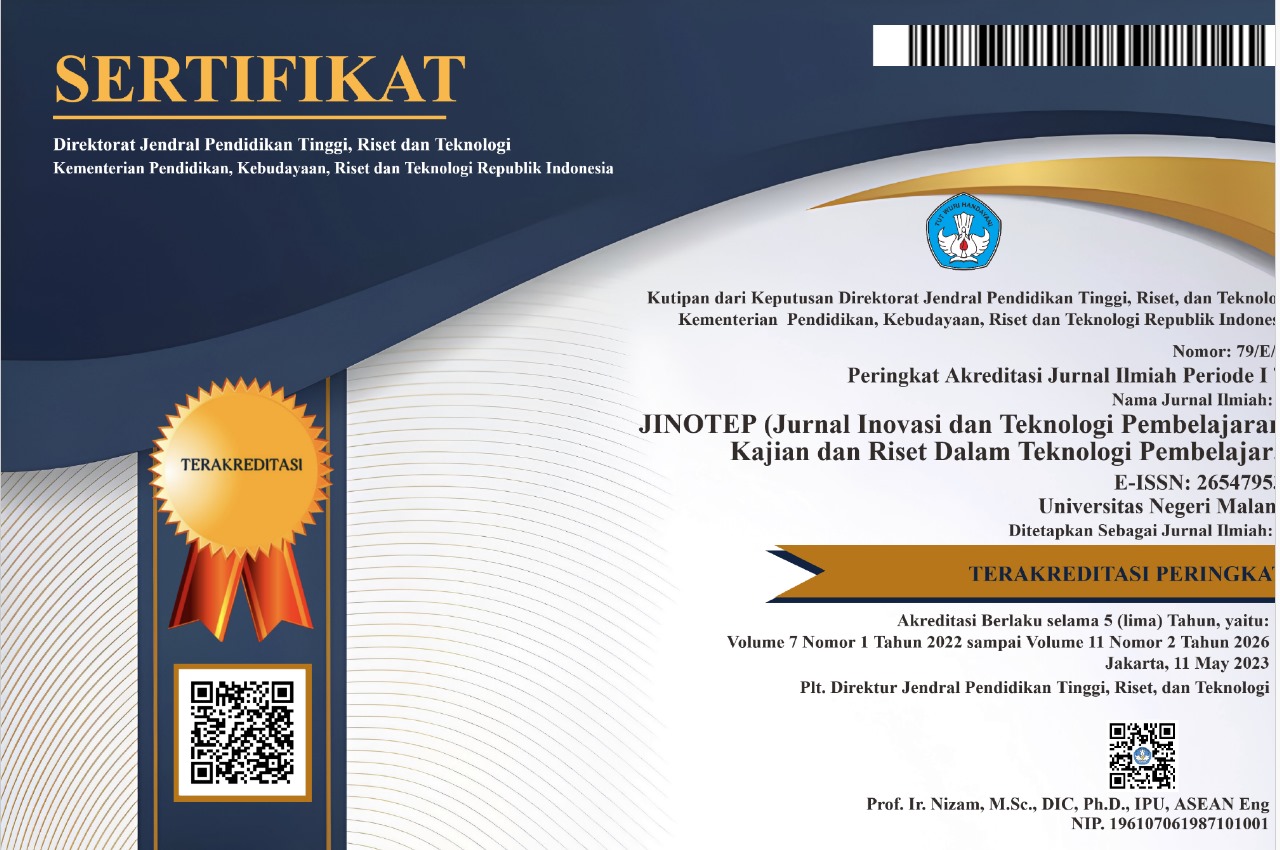The influence of E-PjBL and student learning interest on critical thinking skills
Abstract
Abstrak: Penelitian ini bertujuan untuk menguji pengaruh model pembelajaran electronic project-based learning (E-PjBL) dan minat belajar terhadap kemampuan berpikir kritis pada materi pola pemotongan busana tanpa perca. Penelitian dilakukan di lembaga kursus dan pelatihan di Surabaya dengan jumlah responden sebanyak 120 peserta didik dan terbagi menjadi 2 kelompok yaitu 60 peserta didik pada kelompok kontrol dan 60 peserta didik pada kelompok eksperimen. Hasil analisis menunjukkan sebagai berikut: terdapat pengaruh model pembelajaran electronic project-based learning (E-PjBL) dan metode konvensional serta minat belajar terhadap kemampuan berpikir kritis pada materi pola pemotongan busana tanpa perca dan terdapat interaksi antara model pembelajaran electronic project-based learning (E-PjBL) dan minat belajar terhadap kemampuan berpikir kritis pada materi pola pemotongan busana tanpa perca. Maka dapat disimpulkan dari hasil penelitian bahwa model pembelajaran electronic project-based learning (E-PjBL) dan minat belajar dapat meningkatkan kemampuan berpikir kritis peserta didik.
Abstract: This study attempted to see the impact of the electronic project-based learning (E-PjBL) learning model and learning interest on students' critical thinking skills using Lean pattern fashion design materials. The research was carried out at a course and training institute in Surabaya, with 120 students divided into two groups and surveyed: 60 in the control group and 60 in the experimental group. According to the findings, the electronic project-based learning (E-PjBL) learning model and the traditional learning method and interest increase student's critical thinking skills in fashion design through lean patterns. It also unveiled the relationship between modeling and a desire to learn with critical thinking skills in lean pattern fashion design. As a result of the research findings, the current study concluded that the electronic project-based learning (E-PjBL) learning model and students' interest in learning can improve students' critical thinking abilities.
Keywords
Full Text:
PDFReferences
Afdal, Z., & Febliza, A. (2023). Electronic project-based learning for self-directed thinking. Proceedings of the Ninth Padang International Conference On Economics Education, Economics, Business and Management, Accounting and Entrepreneurship (PICEEBA), 23, 258–264. https://doi.org/10.2991/978-94-6463-158-6_23
Allanta, T. R., & Puspita, L. (2021). Analisis keterampilan berpikir kritis dan self efficacy peserta didik: Dampak PjBL-STEM pada materi ekosistem. Jurnal Inovasi Pendidikan IPA, 7(2), 158–170. https://doi.org/10.21831/jipi.v7i2.42441
Altun, E., & Yildirim, N. (2023). What does critical thinking mean? Examination of pre-service teachers’ cognitive structures and definitions for critical thinking. Thinking Skills and Creativity, 49(10), 101367. https://doi.org/10.1016/j.tsc.2023.101367
Ananda, L. R., Rahmawati, Y., & Khairi, F. (2023). Critical thinking skills of Chemistry students by integrating design thinking with STEAM-PjBL. Journal of Technology and Science Education, 13(1), 352. https://doi.org/10.3926/jotse.1938
Anggraeni, D. M., Prahani, B. K., Suprapto, N., Shofiyah, N., & Jatmiko, B. (2023). Systematic review of problem based learning research in fostering critical thinking skills. Thinking Skills and Creativity, 49(2), 101334. https://doi.org/10.1016/j.tsc.2023.101334
Aston, K. J. (2023). ‘Why is this hard, to have critical thinking?’ Exploring the factors affecting critical thinking with international higher education students. Active Learning in Higher Education, 24(1), 146978742311683. https://doi.org/10.1177/14697874231168341
Berg, C., Philipp, R., & Taff, S. D. (2023). Scoping review of critical thinking literature in healthcare education. Occupational Therapy In Health Care, 37(1), 18–39. https://doi.org/10.1080/07380577.2021.1879411
Bestari, P., Awam, R., Sucipto, E., Marsidin, S., & Rifma, R. (2023). Peran supervisi pendidikan dalam meningkatkan kualitas pembelajaran di era digital. Jurnal Papeda: Jurnal Publikasi Pendidikan Dasar, 5(2), 133–140. https://doi.org/10.36232/jurnalpendidikandasar.v5i2.4016
Campo, L., Galindo-Domínguez, H., Bezanilla, M.-J., Fernández-Nogueira, D., & Poblete, M. (2023). Methodologies for fostering critical thinking skills from university students’ points of view. Education Sciences, 13(2), 132. https://doi.org/10.3390/educsci13020132
Ekaputra, F., & Sanova, A. (2023). Penerapan model pembelajaran flipped classroom-pjbl dalam mengurangi potensi learning loss dan meningkatkan hasil belajar mahasiswa. JUDIKA (Jurnal Pendidikan Unsika), 11(1), 33–43. https://doi.org/10.35706/judika.v11i1.8312
Elvianasti, M., & Kartikawati, E. (2022). Research Trends in PjBL (Project-Based Learning) at Indonesian Journal of Biology Education. Jurnal Iqra': Kajian Ilmu Pendidikan, 7(2), 105-119. https://doi.org/10.25217/ji.v7i2.2464
Fitri, D. Z., & Ernawati. (2023). Persepsi mahasiswa terhadap pembelajaran e-learning pada perkuliahan praktik. Indonesian Gender and Society Journal, 3(2), 31–38. https://doi.org/10.23887/igsj.v3i2.51008
Hasyim, A., & Hayati, N. A. (2023). Analisis kemampuan guru dalam menggunakan e-learning sebagai media pembelajaran di era digital. Ideguru: Jurnal Karya Ilmiah Guru, 8(2), 297–303. https://doi.org/10.51169/ideguru.v8i2.555
Herowati, H. (2023). Analisis penerapan model pembelajaran project based learning (pjbl) materi perubahan fisika dan kimiaterhadap keaktifan belajar peserta didik. Journal of Innovation Research and Knowledge, 2(12), 4603–4612. https://doi.org/10.53625/jirk.v2i12.5672
López, F., Contreras, M., Nussbaum, M., Paredes, R., Gelerstein, D., Alvares, D., & Chiuminatto, P. (2023). Developing critical thinking in technical and vocational education and training. Education Sciences, 13(6), 590. https://doi.org/10.3390/educsci13060590
Lun, V. M.-C., Yeung, J. C., & Ku, K. Y. L. (2023). Effects of mood on critical thinking. Thinking Skills and Creativity, 47(2), 101247. https://doi.org/10.1016/j.tsc.2023.101247
Majuarsa, I. W., & Kasna, I. K. (2023). Konstruksi paradigma identitas dosen dalam mewujudkan berpikir kritis pergulatan budaya positif di kampus. Jurnal Ilmiah Cakrawarti, 6(1), 56–65. https://doi.org/10.47532/jic.v6i1.803
Mulyanti, N. M. B., Gading, I. K., & Diki. (2023). Dampak penerapan model pembelajaran inkuiri terbimbing terhadap hasil belajar ipa dan kemampuan berpikir kritis siswa. Jurnal Ilmiah Pendidikan Profesi Guru, 6(1), 109–119. https://doi.org/10.23887/jippg.v6i1.59276
Nurdiana, N., Hunaepi, H., Ikhsan, M., Suwono, H., & Sulisetijono, S. (2023). Exploring curiosity and critical thinking skills for prospective biology teacher. International Journal of Evaluation and Research in Education (IJERE), 12(1), 131. https://doi.org/10.11591/ijere.v12i1.23302
Nurmasyitah, P., Salim, A., Fransiska, I., Daris, K., Suryani, K. (2023). Implementation merdeka curriculum of learning to students’ learning activities. Jurnal.Larisma.or.Id, 3(1), 39–44. https://doi.org/10.30596/jcositte.v1i1.xxxx
Park, J. H., Li, Y., & Niu, W. (2023). Revisiting creativity and critical thinking through content analysis. Journal of Creativity, 33(2), 100056. https://doi.org/10.1016/j.yjoc.2023.100056
Pramasdyahsari, A. S., Setyawati, R. D., Aini, S. N., Nusuki, U., Arum, J. P., Astutik, I. D., Widodo, W., Zuliah, N., & Salmah, U. (2023). Fostering students’ mathematical critical thinking skills on number patterns through digital book STEM PjBL. Eurasia Journal of Mathematics, Science and Technology Education, 19(7), 2297. https://doi.org/10.29333/ejmste/13342
Radiansyah, E., & Hakim, L. N. (2023). Penguatan pendidikan karakter melalui kegiatan alam bebas. MUHKAL, 1(1), 9–13. https://doi.org/10.52655/muhkal.v1i1.4
Rati, N. W., Arnyana, I. B. P., Dantes, G. R., & Dantes, N. (2023). Hots-oriented e-project-based learning: Improving 4c skills and science learning outcome of elementary school students. International Journal of Information and Education Technology, 13(6), 959–968. https://doi.org/10.18178/ijiet.2023.13.6.1892
Rofiqodduri, N., & Wahyuningsih, S. E. (2023). Kelayakan media pembelajaran video tutorial kemeja berfuring pada mata kuliah produksi busana pria. Fashion and Fashion Education Journal, 12(1), 1–9. https://doi.org/10.15294/ffej.v12i1.65490
Ruslan, R., Syah, A., & Sahabuddin, C. (2023). Analisis minat, keaktifan siswa, dan hasil belajar matematika pada materi statistika dimasa pandemi covid-19 pada siswa kelas viii smp negeri 2 campalagian. Journal Peqguruang: Conference Series, 5(1), 389. https://doi.org/10.35329/jp.v5i1.3294
Sari, R. P., Hasibuan, M. P., Oktaviani, C., Yakob, M., & Nazar, M. (2023). Development of electronic learning chemistry assessment applications through project-based learning for increasing student scientific performance. Jurnal Pendidikan Sains Indonesia, 11(1), 191–205. https://doi.org/10.24815/jpsi.v11i1.27984
Setiawati, R. I., & Shofwan, I. (2023). Implementasi prinsip pendidikan orang dewasa pada pelatihan tata busana di satuan pendidikan non formal skb ungaran. Lifelong Education Journal, 3(1), 39–59. https://doi.org/10.59935/lej.v3i1.180
Setyowati, L., Karmina, S., Sukmawan, S., & Razali, R. (2022). Green project work for process writing amidst the pandemic: Planning, implementing, and reflections. Bahasa Dan Seni: Jurnal Bahasa, Sastra, Seni, Dan Pengajarannya, 50(2), 223. https://doi.org/10.17977/um015v50i22022p223
Siregar, E., Aswan, D., & Kustandi, C. (2023). Online learning design digital guide of social media for teachers. Journal of Nonformal Education, 9(1), 69–76. https://doi.org/10.15294/jne.v9i1.42092
Sukackė, V., Guerra, A. O. P. de C., Ellinger, D., Carlos, V., Petronienė, S., Gaižiūnienė, L., Blanch, S., Marbà-Tallada, A., & Brose, A. (2022). Towards active evidence-based learning in engineering education: A systematic literature review of PBL, PjBL, and CBL. Sustainability, 14(21), 13955. https://doi.org/10.3390/su142113955
Suradika, A., Dewi, H. I., & Nasution, M. I. (2023). Project-based learning and problem-based learning models in critical and creative students. Jurnal Pendidikan IPA Indonesia, 12(1), 153–167. https://doi.org/10.15294/jpii.v12i1.39713
Susilowati, T., Fitriani, W., & Priyono, A. (2022). Eksplorasi mandiri: Pengembangan alat penilaian inovatif bagi siswa sekolah dasar. RESSI:Research and Social Studies Institution, 4(1), 228. https://doi.org/http://dx.doi.org/10.33292/arisen.v4i1.228
Syakur, A., Musyarofah, L., Sulistiyaningsih, S., & Wike, W. (2020). The effect of project based learning (pjbl) continuing learning innovation on learning outcomes of english in higher education. Budapest International Research and Critics in Linguistics and Education (BirLE) Journal, 3(1), 625–630. https://doi.org/10.33258/birle.v3i1.860
Thaseen, I. R., Banu, S., & Rajesh, S. (2023). Iot based ensemble predictive techniques to determine the student observing analysis through e‐learning. Mathematics and Computer Science, 2, 137–150. https://doi.org/10.1002/9781119896715.ch10
Triawang, G., & Kurniawan, E. (2021). The effect of digital literacy towards the selection of social science teacher learning media. Pegem Journal of Education and Instruction, 11(4), 316–319. https://doi.org/10.47750/pegegog.11.04.30
Wulan, D. N., Basri, M., & Imanita, M. (2023). Pengaruh Model Pembelajaran Kooperatif Tipe Kancing Gemerincing (Talking Chips) Terhadap Keaktifan dan Minat Belajar pada Mata Pelajaran IPS Kelas VIII di SMPN 2 Labuhan Maringgai. Journal of Social Science Education, 4(1), 40-45. https://doi.org/10.23960/JIPS/v4i1.40-45
Yusro, A. C., & Ardania, R. (2023). Upaya peningkatan hasil belajar ipa melalui implementasi pembelajaran berdiferensiasi model pjbl dengan media kartu. Jurnal Inovasi Pendidikan Sains (JIPS), 4(1), 1–9. https://doi.org/10.37729/jips.v4i1.3109
Yustiasari, F. (2023). Transformasi kurikulum; kecerdasan buatan untuk membangun pendidikan yang relevan di masa depan. Jurnal IHSAN : Jurnal Pendidikan Islam, 1(2), 62–71. https://doi.org/10.61104/ihsan.v1i2.61
Zahara, S. L., Azkia, Z. U., & Chusni, M. M. (2023). Implementasi teknologi artificial intelligence (ai) dalam bidang pendidikan. Jurnal Penelitian Sains dan Pendidikan (JPSP), 3(1), 15–20. https://doi.org/10.23971/jpsp.v3i1.4022
DOI: http://dx.doi.org/10.17977/um031v11i12024p024
Refbacks
- There are currently no refbacks.
Copyright (c) 2024 Prihatin Prihatin, Wawan Gunawan

This work is licensed under a Creative Commons Attribution-ShareAlike 4.0 International License.
======================================================================
Jurnal Inovasi dan Teknologi Pembelajaran published by Universitas Negeri Malang in collaboration with the Asosiasi Program Studi Teknologi Pendidikan Indonesia (APS TPI) and Ikatan Profesi Teknologi Pendidikan Indonesia (IPTPI) with a MoU.
Publisher Address:
Educational Technology Laboratorium, Building D5, 1st Floor
Faculty of Education, Universitas Negeri Malang
Semarang St. No. 5, Malang City, East Java Province, Postal Code 65145
Email: jinotep.fip@um.ac.id
======================================================================

JINOTEP is licensed under a Creative Commons Attribution-ShareAlike 4.0 International License.
JINOTEP Statistics (Since July 13th, 2020)



.png)




.png)
1.png)
1.png)
4.png)
2.png)
1.png)
1.png)
.png)


_3.png)





1.png)
.png)